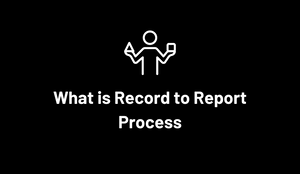Record to Report (R2R) is a finance and accounting process that involves the collection, processing, and reporting of financial information. The R2R process is critical for organizations as it enables them to prepare accurate financial statements, comply with regulatory requirements, and make informed business decisions.

The steps involved in a typical R2R process are:
- Data Collection: In this step, data is collected from various sources such as sales, procurement, payroll, and other financial transactions. This data is then entered into the accounting system.
- Journal Entry: In this step, the transactions are recorded in the general ledger using journal entries. These entries are used to create the financial statements.
- Subledger Reconciliation: In this step, the subledger accounts such as accounts payable, accounts receivable, and inventory are reconciled with the general ledger.
- Trial Balance: In this step, a trial balance is prepared to ensure that the total debits and credits are equal. Any discrepancies are investigated and corrected.
- Adjustments: In this step, any necessary adjustments such as accruals or deferrals are made to the accounts to ensure that the financial statements accurately reflect the financial position of the organization.
- Financial Statements: In this step, the financial statements such as the balance sheet, income statement, and cash flow statement are prepared.
- Close Process: In this final step, the R2R process is closed and the financial statements are reviewed and approved by management. The financial statements are then published for external stakeholders such as investors, creditors, and regulatory bodies.
The R2R process is a complex and iterative process that involves multiple stakeholders and systems. It is important for organizations to have a well-defined R2R process with clearly defined roles and responsibilities, robust systems and controls, and ongoing monitoring and optimization to ensure accuracy, compliance, and efficiency.
What does an RTR Professional do?
A Record to Report (RTR) professional is responsible for managing and overseeing the RTR process within an organization. This involves ensuring the accuracy and completeness of financial data, maintaining compliance with accounting standards and regulations, and optimizing the RTR process to improve financial performance and reduce risk.
Specifically, an RTR professional may be responsible for:
- Leading the monthly, quarterly, and annual financial closing processes, including preparation of financial statements and related reports.
- Ensuring accurate and timely recording of financial transactions in the general ledger.
- Managing and maintaining the chart of accounts and related accounting policies and procedures.
- Overseeing the reconciliation of balance sheet accounts, including bank reconciliations, intercompany reconciliations, and other account reconciliations.
- Monitoring compliance with accounting standards and regulations, including GAAP, IFRS, and local regulations.
- Identifying and resolving issues related to financial data quality, accuracy, and completeness.
- Developing and implementing process improvements to optimize the RTR process, including automation of manual processes and use of technology.
- Collaborating with other departments, such as Accounts Payable, Accounts Receivable, and Tax, to ensure the accuracy and completeness of financial data.
- Providing financial analysis and insights to management to support business decision-making.
Overall, an RTR professional plays a critical role in ensuring the accuracy and completeness of financial data, maintaining compliance with regulations, and optimizing the RTR process to improve financial performance and reduce risk.
What are their key responsibilities?
The key responsibilities of an RTR (Record to Report) professional may include:
- Ensuring the accuracy and completeness of financial data: This involves reviewing and analyzing financial data to ensure it is accurate and complete, and making any necessary adjustments or corrections.
- Maintaining compliance with accounting standards and regulations: RTR professionals are responsible for ensuring compliance with accounting standards and regulations, such as GAAP, IFRS, and local regulations.
- Overseeing the financial close process: This involves managing and overseeing the monthly, quarterly, and annual financial close process, including the preparation of financial statements and related reports.
- Managing the chart of accounts: RTR professionals are responsible for managing and maintaining the chart of accounts, which is the framework for organizing financial transactions.
- Reconciling balance sheet accounts: This involves overseeing the reconciliation of balance sheet accounts, including bank reconciliations, intercompany reconciliations, and other account reconciliations.
- Developing and implementing process improvements: RTR professionals may be responsible for identifying and implementing process improvements to optimize the RTR process, such as automation of manual processes and use of technology.
- Collaborating with other departments: RTR professionals may need to collaborate with other departments, such as Accounts Payable, Accounts Receivable, and Tax, to ensure the accuracy and completeness of financial data.
- Providing financial analysis and insights: RTR professionals may be responsible for providing financial analysis and insights to management to support business decision-making.
Overall, the key responsibilities of an RTR professional are to ensure the accuracy and completeness of financial data, maintain compliance with accounting standards and regulations, and optimize the RTR process to improve financial performance and reduce risk.
Why RTR is one of the most important process in an organization?
The Record to Report (RTR) process is considered one of the most important processes in an organization's accounting and finance function. This is because the RTR process is responsible for ensuring the accuracy and completeness of an organization's financial records, which are critical to making informed business decisions.
Here are some reasons why the RTR process is considered the most important:
- Financial Reporting: The RTR process is responsible for preparing financial reports that are used by internal and external stakeholders, such as investors, regulators, and auditors. Accurate financial reporting is essential to maintaining the trust of stakeholders and making informed business decisions.
- Compliance: The RTR process plays a critical role in ensuring compliance with accounting standards and regulations, such as GAAP, IFRS, and local regulations. Failure to comply with these regulations can result in financial penalties, legal liabilities, and reputational damage.
- Decision Making: The RTR process provides financial information and insights that are used by management to make informed business decisions. Accurate financial information is critical to ensuring that decisions are based on reliable data.
- Risk Management: The RTR process plays a critical role in identifying and managing financial risks, such as fraud, errors, and omissions. Accurate financial records are essential to identifying potential risks and implementing appropriate controls to mitigate them.
In summary, the RTR process is critical to the accuracy and completeness of an organization's financial records, which are essential to making informed business decisions, ensuring compliance with regulations, managing financial risks, and maintaining stakeholder trust.
What are the skills required to work in this role?
Working in an RTR (Record to Report) role requires a combination of technical accounting knowledge, analytical skills, and soft skills. Some of the key skills required to work in this role include:
- Accounting Knowledge: Strong knowledge of accounting principles, such as GAAP, IFRS, and local regulations, is essential to perform effectively in an RTR role. Knowledge of financial statements and their components is also essential.
- Technical Skills: Proficiency in accounting software and other financial systems, such as ERP (Enterprise Resource Planning) systems and Microsoft Excel, is important to efficiently manage large volumes of financial data and perform complex analyses.
- Analytical Skills: Strong analytical skills are important to identify patterns and trends in financial data, troubleshoot issues, and develop solutions to improve processes.
- Attention to Detail: The RTR process involves managing large volumes of financial data and records, and even small errors can have significant consequences. Attention to detail is essential to ensure that financial records are accurate and complete.
- Communication Skills: Effective communication skills, both written and verbal, are important to interact with stakeholders across the organization, such as senior management, auditors, and other departments.
- Problem-Solving Skills: The RTR process can be complex and challenging, and problems may arise that require creative solutions. Strong problem-solving skills are essential to identify issues and develop effective solutions.
- Time Management: The RTR process can involve multiple deadlines and competing priorities. Strong time management skills are important to effectively manage time and prioritize tasks to meet deadlines.
Overall, working in an RTR role requires a combination of technical accounting knowledge, analytical skills, and soft skills such as communication, problem-solving, and time management.

